Related Research Articles

Lulu Kennedy-Cairns is a Scottish singer, actress and television personality.
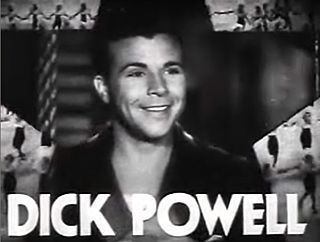
Richard Ewing Powell was an American actor, musician, producer, director, and studio head. Though he came to stardom as a musical comedy performer, he showed versatility, and successfully transformed into a hardboiled leading man, starring in projects of a more dramatic nature. He was the first actor to portray private detective Philip Marlowe on screen.

Christmas Eve on Sesame Street is an American Sesame Street Christmas special first broadcast on PBS on Sunday, December 3, 1978.

"Rubber Duckie" is a song sung by the Muppet character Ernie on Sesame Street. The song is named after Ernie's toy, a rubber duck affectionately named Rubber Duckie.
"Minnie the Moocher" is a jazz song first recorded in 1931 by Cab Calloway and His Orchestra, selling over a million copies. "Minnie the Moocher" is most famous for its nonsensical ad libbed ("scat") lyrics. In performances, Calloway would have the audience and the band members participate by repeating each scat phrase in a form of call and response, until making it too fast and complicated for the audience to replicate it.
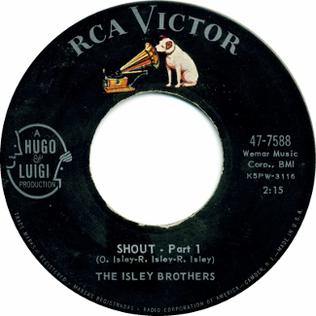
"Shout" is a popular song, written and originally recorded by American vocal group the Isley Brothers in 1959. Later versions include a UK top ten hit in 1964 by Scottish singer Lulu.
"Don't Look Back" is a 1965 song recorded by The Temptations for the Gordy (Motown) label. The flip side to their Top 20 hit "My Baby", "Don't Look Back" broke out and became a hit among the R&B audience on its own, reaching #14 on the R&B charts.
"On the Street Where You Live" is a song with music by Frederick Loewe and lyrics by Alan Jay Lerner from the 1956 Broadway musical My Fair Lady. It is sung in the musical by the character Freddy Eynsford-Hill, who was portrayed by John Michael King in the original production. In the 1964 film version, it was sung by Bill Shirley, dubbing for actor Jeremy Brett.
"Cocaine Blues" is a Western swing song written by T. J. "Red" Arnall, a reworking of the traditional song "Little Sadie".

"I Could Have Danced All Night" is a song from the musical My Fair Lady, with music written by Frederick Loewe and lyrics by Alan Jay Lerner, published in 1956. The song is sung by the musical's heroine, Eliza Doolittle, expressing her exhilaration and excitement after an impromptu dance with her tutor, Henry Higgins - in the small hours of the morning. In a counterpoint during the second of 3 rounds, two maids and the housekeeper, Mrs. Pearce, urge Eliza to go to bed, but she ignores them.
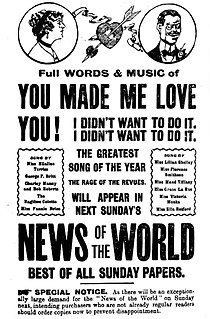
"You Made Me Love You " is a popular song from 1913 composed by James V. Monaco with lyrics by Joseph McCarthy. It was introduced by Al Jolson in the Broadway revue The Honeymoon Express (1913), and used in the 1973 revival of the musical Irene.

"Theme from Shaft", written and recorded by Isaac Hayes in 1971, is the soul and funk-styled theme song to the Metro-Goldwyn-Mayer film Shaft. The theme was released as a single two months after the movie's soundtrack by Stax Records' Enterprise label. "Theme from Shaft" went to number two on the Billboard Soul Singles chart and to number one on the Billboard Hot 100 in the United States in November 1971. The song was also well received by adult audiences, reaching number six on Billboard's Easy Listening chart. The song is considered by some to be one of the first disco songs.
"Miss Otis Regrets" is a song about the lynching of a society woman after she murders her unfaithful lover. It was composed by Cole Porter in 1934, and first performed by Douglas Byng in Hi Diddle Diddle, a revue that opened on October 3, 1934, at London's Savoy Theatre.

"The Gold Diggers' Song " is a song from the 1933 Warner Bros. film Gold Diggers of 1933, sung in the opening sequence by Ginger Rogers and chorus. The entire song is never performed in the 1933 movie, though it introduces the film in the opening scene. Later in the movie, the tune is heard off stage in rehearsal as the director continues a discussion on camera about other matters.
"You Gotta Be a Football Hero" is a song written by Al Sherman, Buddy Fields and Al Lewis in 1933. It is one of the most widely recorded and performed American football anthems of all time.
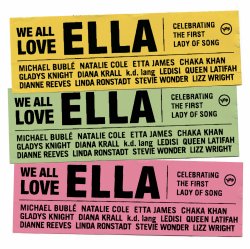
We All Love Ella: Celebrating the First Lady of Song is a 2007 tribute album to Ella Fitzgerald produced by Phil Ramone for Verve Records, released to mark the 90th anniversary of her birth. The "all-star" list of featured vocalists is backed for most part by an orchestra led by Rob Mounsey. The album contains the first release of a duet of Ella Fitzgerald and Stevie Wonder, who joined her on stage with her small band at the New Orleans Jazz and Heritage Festival in 1977.
The King Brothers were a British pop vocal trio popular in the late 1950s and early 1960s. They are best remembered for their cover versions of "Standing on the Corner" and "A White Sport Coat ".
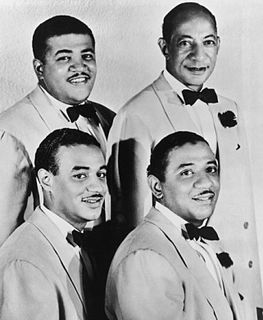
The Mills Brothers, sometimes billed the Four Mills Brothers, and originally known as the Four Kings of Harmony, were an American jazz and traditional pop vocal quartet who made more than 2,000 recordings that sold more than 50 million copies and garnered at least three dozen gold records.
"Sweet Sue, Just You" is an American popular song of 1928, composed by Victor Young with lyrics by Will J. Harris. Popular versions in 1928 were by Earl Burtnett and by Ben Pollack.
References
- ↑ Jazzstandards.com
- ↑ Swing! Here and Now: 3rd Trumpet, 2001, P.8
- ↑ Philip Furia: American Song Lyricists, 1920-1960, 2002, P.120
- ↑ Sesame Street - Lulu's Back in Town, YouTube